Before Disaster Strikes
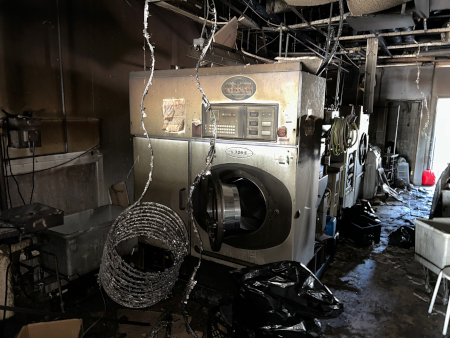
By Kevin Marois

I remember my first fire – I was a teenager. My father and I were going to a customer’s home to take some drapes down for cleaning. Everything looked normal till we got off the elevator. It was about the 10th floor and there was a line all the way around the room about 4 feet off the floor. Everything below the line looked normal. Everything above the line was totally black and covered with soot.
It was a high-rise building made of concrete and drywall, so the building didn’t burn. It was smoke damage from some contents that caught on fire. There wasn’t a lot of physical damage to the building, but several families lives were in chaos.
There is way too much to cover on this topic for one article, so we will focus on fires and floods in this article. Next month we will talk about some other problems you need to be prepared for.
Fires
Most buildings nowadays are constructed of fire-resistant materials: concrete, drywall, glass and brick help prevent fires from starting. It’s not usually the building that catches on fire – it’s normally just the contents. Some older dry cleaning plants, though, are built of wood. You need to know how your plant is constructed and how it is heated. Are there some things that you need to be cautious of in your building?
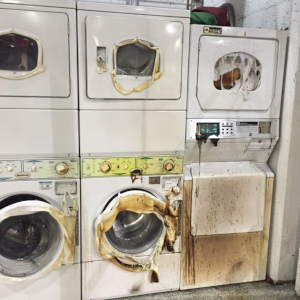
A fire is the most serious disaster that we usually face. We have been involved in the clean-up of quite a few fires. Please don’t say, “That will never happen to me.” It happens more often than you might think.
We have dealt with three or four fires that started in dryers. Maybe the towels have massage oils on them and spontaneously combust. Maybe you are cleaning printer rags and they have solvent on them.
When do dryer fires occur? An hour after you go home. The dryer stops and the fabric is sitting on that hot basket. Eventually it begins to smoulder and catches on fire. ALWAYS EMPTY YOUR DRYERS BEFORE YOU GO HOME AT NIGHT.
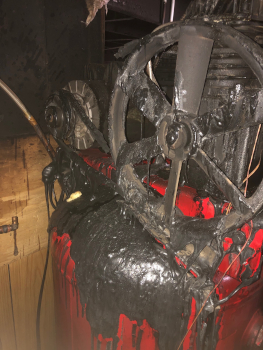
We had a customer who forgot to turn the air compressor off at night. There was an air leak – the compressor was probably running non-stop and eventually it caught on fire. That one was in a basement and the wooden joists above it caught on fire. That particular fire took almost two years before the owners were done with the insurance company and the repairs.
We had another customer who unloaded towels from their dryer into a buggy and it caught on fire several hours later. The cool-down on the dryer wasn’t working properly.
In that fire there wasn’t a lot of things melted or burned – the damage was caused by the smoke.
Smoke will penetrate into crevasses, closed drawers, electrical panels – everywhere. We often clean electrical circuit boards after a fire. Over time the smoke residue can become acid and damage the computer. Such a computer may have intermittent problems – when the cause is discovered six months after the fire, it’s hard to make an additional claim.
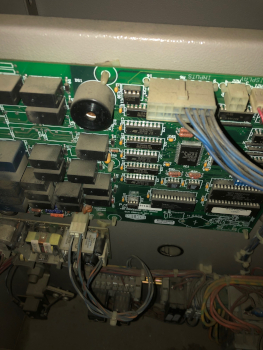
Every fire is different and the ‘experts’ may require things we think are unreasonable. After one fire, they replaced all the circuit breakers in the electrical panel in case they had been damaged by the smoke. In another fire, the engineers required that the roof trusses be replaced because they may have been damaged from the excessive heat.
Floods
Floods are not as devastating as fires but they are probably more common. The sewer gets plugged and everything starts backing up. Or there is a major rainstorm and the sewers can’t handle the water. If you are on-site, you may be able to reduce the damage.
One customer arrived at his store on a Monday morning and the water was 6″ up the inside of the front door and running out everywhere. Do you know where the water shut-off valve is? One customer called because a main pipe burst above the ceiling and was spraying out 15′ all over the dry cleaning machine. (That is why we don’t normally use PEX pipe – flexible cross-linked polyethylene – when we build a plant.) They didn’t know where the water shut-off valve was, so they had to wait 45 minutes until we arrived.
The biggest concern with water is getting the electrical components dried out. Water and electricity don’t mix. The next concern would be getting the walls and contents dried out before black mold develops.
The other issue is that the flood doesn’t just affect you. That water is going into your neighbours’ areas, too. You need to react quickly to help them recover, as well. Communicate clearly and don’t try to hide things. They will know something is going on.
Recovery
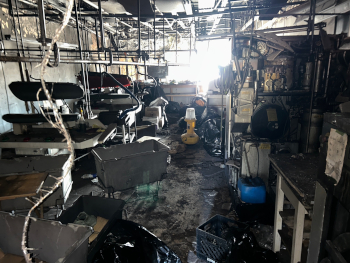
So you have just lived through the worst day of your life. Now how do you pick up the pieces and move on? You need documentation. You need to list and photograph everything that was damaged. You need to document the time you spent cleaning up. You need to work closely with your insurance adjuster and clean-up contractor.
In spite of what they say, the ‘experts’ are not in a rush to get your business running again. You need to be pestering them every day and following up with the experts that are holding up the next step in the process. It is not unusual for an insurance claim to take one or even two years to settle. We know of more than one plant that never rebuilt after a disaster. Your adjuster needs to know that you will be calling again tomorrow to ask what is happening. And the next day.
Planning
The key to surviving an event like this is to plan for it to happen. Train your staff on how to deal with an emergency. Show them how to use a fire extinguisher. Show them where the shut-off valves are located. Where are the circuit breakers? Where is the main gas valve?
There are also resources that you need to have off-site.
- Lists and photographs of your current equipment. It is not always possible to get the information off the machine after a fire. This includes what you paid for it and when, serial numbers, full details.
- Have SDS sheets accessible for the fire department and the clean-up crew.
- Have a backup of Accounts Receivable and Accounts Payable.
- A master list of Human Resources information: employee contact info, payroll info, etc.
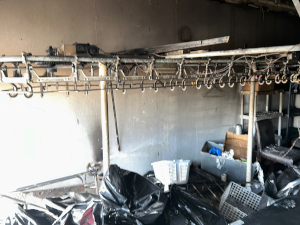
Can you document what customers’ garment were in your possession for the Bailee policy? What was your inventory of supplies? It’s hard to prove what you had when it has all burned up.
How do you recover from a disaster? You plan for it and figure out how to handle everything ahead of time.
Insurance
We all have insurance. What we may not know is, do we have adequate insurance?
We had a customer from a small town that bought insurance from the local agent. She had $160,000 in insurance. She had a fire and lost everything. The $160,000 was supposed to cover replacing her building, her customers’ garments and all her equipment. She had three dry cleaning machines, plus all the other machines. The insurance wouldn’t even cover two of her dry cleaning machines. She never got over the disaster. I spoke to her 18 months after the fire and they still had not settled with the insurance company.
You are betting your future on your insurance agent. You better do some checking and make sure you have adequate insurance.
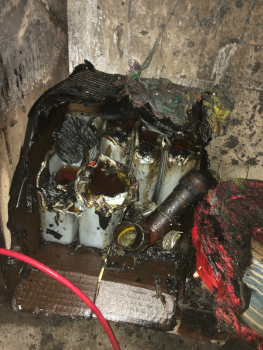
The first thing the insurance company will require is documentation on everything that was damaged. How much did you pay for it? What is it worth now? Find someone who understands our industry and get adequate coverage. Yes, it’s expensive – but not as expensive as not enough insurance.
You say you have Business Interruption coverage – that’s great! But they don’t just write you a cheque. You need to document what your income was. You have to show the loss before you can make a claim. Yes, you should hire an accountant to handle that part of your claim.
Is your equipment insurance coverage replacement cost or just the depreciated value? There is a big difference. Do you have enough insurance to cover all your equipment? If you don’t have adequate coverage, you will share in the loss. Insurance companies work on documentation. The more things you can ‘prove’ the easier your claim will be to settle.
Perspective
Viewing a situation as a disaster depends on your point of view. Many of our customers do fire and flood work. They go out, pack up the clothes, clean them and return them. Just another day at the office. Why? Because they are experienced, they are trained and most of all they are prepared. They have a plan. They know what is required to get things back to normal and they do what is needed. These are not disasters to them.
Disaster is a matter of perspective and preparation. I am not trying to negate the trauma if someone has been injured. Aside from that, it’s just clothing and machinery that has been damaged – it’s not a problem if you can document it. Make a list and get to work. This will be one of the most difficult things you have had to deal with, but it’s not impossible.
Will You Survive?
When disaster strikes, you can survive. Put your plans into action. Start working 16-hour days. Start pushing the insurance company. Reassure your customers that you will be back and you will take care of them. Help your staff. This is traumatic and they are worried about their futures. It will be OK. You have a plan and everything is under control again. Next month we will talk about equipment-related disasters and how to recover from them.







